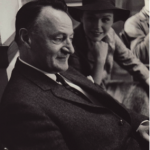“Lincoln” and the Law
 Reviewers of Steven Spielberg’s “Lincoln” have rightfully praised the film for its faithfulness to history and for the fine acting of Daniel Day Lewis, Sally Field, and Tommy Lee Jones, among others. As a “lifer” in legal academics, I was intrigued by the film’s engagement with law, lawmaking, and law-related ideology.
Reviewers of Steven Spielberg’s “Lincoln” have rightfully praised the film for its faithfulness to history and for the fine acting of Daniel Day Lewis, Sally Field, and Tommy Lee Jones, among others. As a “lifer” in legal academics, I was intrigued by the film’s engagement with law, lawmaking, and law-related ideology.
The most important “law” in the film is the 13th Amendment to the United States Constitution, and the film accurately suggests that the Amendment’s ratification in 1865 was more important in formally ending slavery than was the more famous Emancipation Proclamation. The latter, issued by President Lincoln in 1863, served only to free slaves in the ten Confederate states warring against the Union. Lincoln issued the Emancipation Proclamation chiefly as a war measure and hoped it would prompt slaves to take up arms against slave owners.

